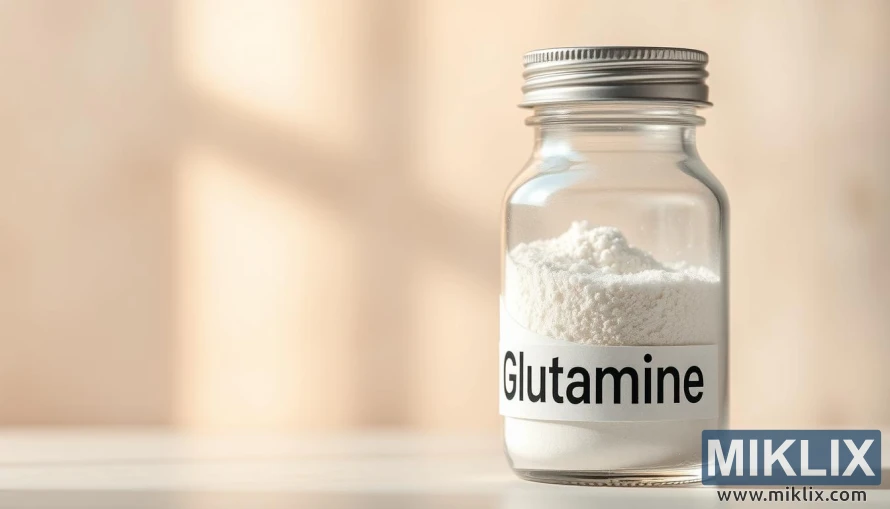Fuel Your Fitness: How Glutamine Supplements Boost Recovery and Performance
Published: June 26, 2025 at 2:24:06 PM UTC
Glutamine is the most abundant amino acid in the human body, playing a key role in various health functions. It is vital for immune support, aids in muscle recovery, and promotes digestive health. This article explores the numerous health benefits of glutamine supplements, focusing on those recovering from illnesses or injuries. It helps understand how glutamine supports overall health, aiding in the decision to use supplements.

Key Takeaways
- Glutamine is vital for immune support and overall health.
- It aids in muscle recovery after physical exertion.
- Glutamine supplements can enhance digestive health.
- The amino acid is beneficial for individuals recovering from injuries.
- Supplementation can be considered for specific health conditions.
- Understanding the dosages and food sources can optimize glutamine intake.
What is Glutamine?
Glutamine is a conditional nonessential amino acid, meaning the body usually makes enough of it. But, when we're under stress or sick, our need for glutamine can outstrip what we produce. Knowing what glutamine is helps us understand its importance in our health.
Glutamine comes in two main forms: L-glutamine and D-glutamine. L-glutamine is the more common type in our bodies and can be found in many foods. It's key for making proteins and building other amino acids. On the other hand, D-glutamine is less common and doesn't play a significant role in our metabolism.
The different types of glutamine affect our body's functions in various ways. L-glutamine, for instance, is essential for muscle health and keeping our immune system strong, mainly when we're under physical stress.
How Glutamine Supports the Immune System
Glutamine is essential for the immune system, acting as a primary fuel for immune cells, like white blood cells. These cells are vital for combating infections and maintaining health. During severe illness or surgery, glutamine levels can plummet, weakening the immune response.
Low glutamine levels can impair white blood cell function, making us more prone to infections. Supplementing with glutamine can help replenish these levels, boosting our immune function. Studies indicate that boosting glutamine intake can lead to better health outcomes for those critically ill. This includes shorter hospital stays and fewer infections.
The Role of Glutamine in Digestive Health
Glutamine acts as a vital energy source for intestinal cells, ensuring optimal intestinal health. It helps maintain a strong gut barrier, which is key in preventing damage that could lead to leaky gut. When the gut barrier weakens, toxins and bacteria can leak into the bloodstream, posing health risks.
A healthy gut is essential for the immune system, as most immune functions occur in the intestines. Glutamine supports digestive health by strengthening this critical gut barrier, reducing the risk of leaky gut syndrome. It plays a significant role in sustaining intestinal health, highlighting its importance as a supplement for overall well-being.
Glutamine and Muscle Recovery
Glutamine is vital for muscle recovery after intense workouts. It's a key player in protein synthesis, helping repair muscle damage. Studies show that glutamine supplements can lessen muscle soreness, aiding in faster recovery for athletes.
This can boost performance in endurance and strength sports. While the connection to muscle gain is not as clear, maintaining glutamine levels is critical. It helps replenish muscle nutrients after exercise. Adequate glutamine intake can speed up recovery, enabling athletes to train more often and effectively.
Incorporating glutamine-rich foods or supplements can offer significant support. This is essential for those looking to enhance their recovery and performance.

Potential Benefits for Athletes
Athletes often seek glutamine supplements to boost their performance and recovery. The benefits of glutamine in sports nutrition are a topic of interest. Some studies suggest it may reduce fatigue and muscle soreness after exercise. Athletes, due to intense training, need nutrients that support their performance.
The scientific consensus on glutamine's benefits is not clear-cut. Research indicates it can aid in recovery and reduce muscle damage. Yet, not all studies agree on this.
Healthy athletes usually get enough glutamine from their diet. Foods like meat, fish, dairy, and legumes provide the necessary amounts. Before considering supplements, athletes should assess their dietary intake and recovery needs.
Glutamine in Conditions like Sickle Cell Disease
Glutamine treatment is showing great promise in managing sickle cell disease. The FDA has approved L-glutamine, known as Endari, for those with this condition. Studies suggest it can greatly reduce painful crises, a major issue for sickle cell patients.
Using Endari can lead to better health outcomes, including fewer blood vessel blockages. This amino acid improves the quality of life for those with sickle cell disease. Healthcare professionals are now seeing glutamine as a key component in treating this complex condition.

Glutamine's Role in Burn Recovery
Severe burns pose a significant challenge to the body, often leading to glutamine depletion. This essential amino acid is vital for immune function and healing processes. Studies indicate that low glutamine levels increase infection risk, complicating burn recovery.
Glutamine supplementation may improve healing outcomes for severe burn patients. It aids in tissue repair and stress management, boosting recovery rates. Nutritionists often suggest glutamine to enhance wound management and immune support during recovery.
In clinical settings, glutamine reduces infection rates in burn patients. Adequate glutamine ensures faster and more effective healing from severe wounds.
Glutamine for Post-Surgery Recovery
Recovering from surgery is a tough journey, and keeping glutamine levels up can help. Glutamine's benefits are clear, as it boosts immune function. This is key in fighting off infections that often come with surgery. A strong immune system speeds up healing and recovery.
Studies indicate glutamine could help reduce hospital stays after surgery. This means patients might get back to their lives sooner. While the results are encouraging, more research is needed to confirm glutamine's role in recovery.

Adding glutamine to your recovery plan might be wise, but always talk to a doctor first. They can tailor advice based on your specific needs. This approach helps address any concerns and ensures a smooth recovery.
Effects of Glutamine on Overall Health
Glutamine is a versatile amino acid that significantly impacts overall health. Its influence extends beyond muscle recovery and immune support. It plays a key role in various bodily functions. Glutamine benefits include its roles in metabolic processes, nutrient absorption, and energy production at the cellular level.
Maintaining adequate levels of glutamine is essential, more so during physical or emotional stress. This amino acid health is vital for promoting well-being and supporting the body's physiological functions. A balanced supply of glutamine can enhance performance, facilitate recovery, and improve individual health outcomes.
Possible Side Effects of Glutamine Supplements
Glutamine is known for its benefits, but it's vital to acknowledge the possible side effects of supplementation. Some people may face gastrointestinal issues like bloating, gas, and diarrhea. Others might experience headaches, often when taking higher doses.
Allergic reactions are a concern for some. Symptoms can include itching, swelling, or trouble breathing. Given the differences in how people react, it's important not to overlook the risks of glutamine supplements.
The long-term effects of high-dose glutamine intake are not fully understood. It's wise to consult a healthcare provider before starting any supplement regimen. This ensures your health conditions and any interactions with other medications are considered.

Dosage Recommendations for Glutamine
When considering glutamine dosage, it's vital to adjust it based on individual health needs and conditions. Most people require between 3 to 6 grams daily. This amount is usually enough to keep glutamine levels in check in a healthy body.
In cases of major surgeries, injuries, or intense athletic training, healthcare providers might recommend higher doses. These situations often require increased glutamine intake to support the body's heightened recovery needs.
Before starting glutamine supplements, it's critical to consult a healthcare professional. They can provide personalized advice. This ensures the dosage is right for your health status and goals. It helps maximize the benefits of glutamine while ensuring safety.
Food Sources of Glutamine
Glutamine, a vital amino acid, is found in various food sources. These come from both animal and plant origins. For those looking to boost their glutamine intake, knowing the main sources is key.
Animal products are the best sources of glutamine. Here are some rich options:
- Beef
- Poultry
- Fish
- Dairy products such as yogurt and cheese
- Eggs
While animal products offer more glutamine, some plant foods also contribute. These include:
- Tofu
- Beans
- Corn
- Spinach
A diet that includes both animal and plant sources is best for getting enough glutamine. This knowledge helps people make better food choices for their health.
When to Consider Glutamine Supplements
Understanding when to consider glutamine supplements is key to maximizing their benefits. Different scenarios might require supplementation, mainly when the body's glutamine production is insufficient due to increased demand. Key factors influencing the need for glutamine supplements include:
- Recovery phase post-surgery or from serious injuries
- Illness that leads to heightened physiological stress
- Health conditions such as gastrointestinal disorders where glutamine depletion may occur
For those dealing with challenging health conditions, evaluating glutamine's role is critical. Seeking advice from healthcare professionals is essential. They can tailor approaches based on individual needs, ensuring supplementation aligns with health goals and treatment plans. Effective communication with a physician is vital to understand when glutamine supplementation is beneficial and how to incorporate it responsibly into a health regimen.
Conclusion
The benefits of glutamine are vast, touching on immune function, digestive health, and muscle recovery. It's essential for those under stress, whether from intense workouts, surgery, or specific health issues. A detailed look at glutamine highlights its importance. While supplements can offer significant benefits, most healthy individuals can get enough from their diet.
Adopting a well-rounded nutrition plan often fulfills glutamine needs without supplements. Yet, it's prudent to seek advice from a healthcare expert before adding supplements to your regimen. This step ensures that any supplement choice is safe and effective for your health goals.
Whether you're an athlete aiming for quick recovery, someone facing a health challenge, or simply seeking to boost your overall health, grasping glutamine's wide-ranging benefits is key. It guides your decisions on supplements and dietary choices, helping you make informed choices for your well-being.
Further Reading
If you enjoyed this post, you may also like these suggestions:
- Taurine Turbocharge: Natural Support for Metabolism, Mood and Immunity
- Stronger with Spinach: Why This Green is a Nutritional Superstar
- From Digestion to Detox: The Healing Magic of Papaya
